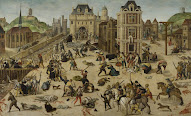A Mighty Fortress is Our God
(Ein’ feste Burg ist unser Gott.)
[An essay by “G. B.”] (concluded from Part 1)
Prince Frederick III, Count Palatine, who was asked why he did not build fortresses in his country, answered: “‘A mighty Fortress is our God, A trusty Shield and Weapon’; so we have faithful subjects and, in case of need, a number of warriors who can resist our enemies not only with shields and weapons, but also and especially with prayer.
This is why the noble Swedish king, Gustavus Adolphus, resorted to such arms and weapons on the morning of the battle of Leipzig on September 17, 1631, when he was facing Tilly. Before the battle began, he had his entire army sing this song, and when God helped him to victory and he saw the enemy fleeing everywhere, he threw himself on his knees in the midst of the dead and wounded, thanked God and cried out: He must keep the field.
In 1517, Wolfgang, Prince of Anhält, whose name shines under the Augsburg Confession, was declared an outlaw [Acht] by the emperor and his land was given to a Spanish favorite. When the letter banning him arrived, he sat on horseback, rode through the dismayed city and sang this song in a bright voice on the market square as a farewell, especially the lines: Take away our bodies, etc. Afterwards, he hid in a mill for a long time, dressed as a miller, until he was reinstated in possession of his land by the Peace of Passau in 1550.
When Emperor Charles V dismissed the evangelical preachers in Augsburg in 1548 because they did not want to accept the [Augsburg] Interim, and especially the brave theologian [Andreas] Wolfgang Musculus had preached vehemently against it in Augsburg, they came to the imprisoned Elector of Saxony, John Frederick, who was a prisoner in Augsburg at the time, and told him as they were leaving that they had not only been deprived of their service, but that Imperial Majesty had also forbidden them to enter the Roman Empire. At this, the Elector began to weep so that tears flowed down his cheeks to the ground, stood up, went to the window, but soon turned to them again and said:
“Has the Emperor forbidden you the entire Roman Empire?”
“Yes!”
Then he asked again, “Has the emperor also forbidden you heaven?”
“No.”
“Well,” he continued, “there is still no need, the kingdom and heaven must remain with us, then God will also find a land where you can preach His Word.”
He then had his saddlebag brought and said:
“In it is everything I have on earth; from it I will give you money for the journey [Zehrpfennig], which you can divide among your brothers and companions of the cross, even though I am a poor captive prince, God will surely give me something again.”
When the expelled Salzburgers came to Darmstadt in the spring of 1732, they were accompanied by an innumerable crowd into the city church, while they sang this song as their migration passport and all the people joined in.
Tobias Kiessling, the godly merchant of Nuremberg, tells us that he often saw and heard how, for example in Linz, Protestant men and women were dragged and packed onto ships to be taken to the lowest regions of Hungary and Transylvania. The little children were torn from their mothers' breasts and arms and the mothers were left to decide whether they wanted to stay with their children and follow the Catholic faith or to separate from them for life. The mothers wept bitterly, looked up, turned away, hurried to the mobs of other religious fighters who were being led away into exile, and sang heartbreakingly: “Take they our life, goods, fame, child, and wife, etc.”
 |
| St. Bartholomew's Day massacre |
This psalm was also the Huguenots' daily song of strength in those bloody wars and persecutions that came upon them in 1560-72; even when they were executed by fire and sword, they died joyfully with this song without denying their faith. A noble Catholic count who came to Germany with Charles V in 1547 once heard the Lutheran psalm sung: Ein Feste Burg ist unser Gott (A Mighty Fortress is Our God); and he said, “I will help to destroy this fortress, or I will not live.” But he suddenly fell ill on the third day afterwards and came to a terrible end.






No comments:
Post a Comment
Comments only accepted when directly related to the post.